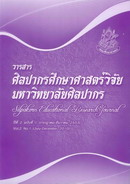การวิจัยและพัฒนาหลักสูตรผู้ประกอบการธุรกิจรุ่นเยาว์ตามแนวคิด การฝึกทางปัญญาจากต้นแบบ เพื่อเสริมสร้างสมรรถนะทางธุรกิจ ของนักเรียนมัธยมศึกษาตอนปลาย
บทคัดย่อ
บทคัดย่อ
การวิจัยและพัฒนาหลักสูตรครั้งนี้มีวัตถุประสงค์ เพื่อพัฒนาและประเมินคุณภาพของหลักสูตรผู้ประกอบการธุรกิจรุ่นเยาว์ ตามแนวคิดการฝึกทางปัญญาจากต้นแบบ สำหรับนักเรียนชั้นมัธยมศึกษาตอนปลาย มีกระบวนการวิจัยและพัฒนาหลักสูตร 5 ขั้นตอน ได้แก่ 1) การสำรวจข้อมูลพื้นฐานในการจัดการเรียนการสอนธุรกิจ สมรรถนะทางธุรกิจและความต้องการของผู้เรียน 2) การศึกษาแนวคิด ทฤษฎี และงานวิจัยเกี่ยวกับการพัฒนาหลักสูตร และการฝึกทางปัญญาจากต้นแบบ 3) การสร้างหลักสูตรตามรูปแบบการฝึกทางปัญญาจากต้นแบบ 4) การทดลองใช้หลักสูตรผู้ประกอบการธุรกิจรุ่นเยาว์ 5) การปรับปรุงแก้ไขเพื่อให้เป็นหลักสูตรที่สมบูรณ์ กลุ่มเป้าหมาย ได้แก่นักเรียนชั้นมัธยมศึกษาปีที่ 5 โรงเรียนสายปัญญา ในพระบรมราชินูปถัมภ์ สังกัดสำนักงานเขตพื้นที่การศึกษามัธยมศึกษา เขต 1 สำนักงานคณะกรรมการการศึกษาขั้นพื้นฐาน จำนวน 38 คน โดยวิธีการเลือกแบบเฉพาะเจาะจง ตัวแปรได้แก่หลักสูตรผู้ประกอบการธุรกิจรุ่นเยาว์ตามแนวคิดการฝึกทางปัญญาจากต้นแบบ ใช้ระยะเวลาในการทดลอง 16 สัปดาห์ ผลการวิจัยพบว่า 1) นักเรียนกลุ่มทดลองที่ใช้หลักสูตรผู้ประกอบการธุรกิจรุ่นเยาว์มีความรู้ความเข้าใจเกี่ยวกับเนื้อหาทางด้านธุรกิจสูงกว่าเกณฑ์ 2) นักเรียนกลุ่มทดลองที่ใช้หลักสูตรผู้ประกอบการธุรกิจรุ่นเยาว์มีพฤติกรรมความสามารถการจัดการในการประกอบการธุรกิจสูง 3) นักเรียนกลุ่มทดลองที่ใช้หลักสูตรผู้ประกอบการธุรกิจรุ่นเยาว์ มีแรงขับพฤติกรรมการประกอบการธุรกิจอย่างมีนัยสำคัญ และมีประสิทธิภาพตามเกณฑ์ที่กำหนด
Abstract
The objectives of this paper are to develop : the junior entrepreneur curriculum based on cognitive apprenticeship approach for upper secondary school students and to evaluate the junior entrepreneur curriculum. The research and development of the curriculum has been done through the 5 stages : 1) researching fundamental data on essence for business teaching , business competence and needs of learners; 2) educating concept, theories and researches related to curriculum development and cognitive apprenticeship approach; 3) developing a curriculum based on cognitive apprenticeship approach; 4) experimenting with using the efficiency of a junior entrepreneur curriculum; 5) revising to the complete curriculum. The target group is 38 students in mattayam 5 at Saipanya school, the secondary education service area office 1, office of the basic education commission, selected by purposive sampling technique. The duration was 16 weeks. It is found that the junior entrepreneur curriculum based on cognitive apprenticeship approach has enhanced business competence of the target group in three domains : the knowledge application in actual business situation, business operation and positive attitude career.





